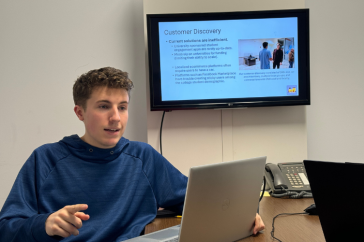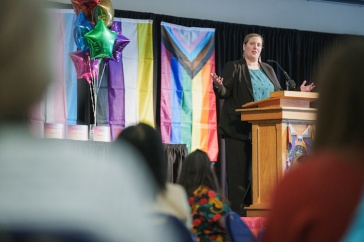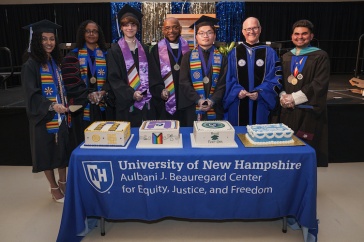|
|

Raising the bar: Anne Hemmings (left) and JoAnne Diaz-Beckett (right) are earning dual law and business degrees at the UNH School of Law and Whittemore School of Business and Economics. (Photo: Lisa Nugent)
What kind of person would want to take time out from her prime earning years to go through the grind of earning not one, but two demanding degrees compressed into three-and-a-half years?
Last fall, the first cohort of dual JD-MBA students to enroll at the UNH School of Law and the Whittemore School of Business and Economics answered this question. Take it from UNH Today, they’re two — yes, two — of the hardest working people you’ll meet.
A native of New Canaan, Connecticut, Anne Hemmings had worked in the ski apparel industry for seven years under the open skies of Jackson, Wyoming, when she felt the calling to study the law. “My grandmother graduated from the University of Kentucky Law School in 1939 and was the first female editor of the law review,” says Hemmings. “So law school has always been in the back of my mind.”
By July of 2010, she earned admission to several law schools, including Franklin Pierce Law Center. As she deliberated about where to go, she learned of a new development that practically made her decision for her. “I almost did not attend UNH,” admits Hemmings, “but when they announced Franklin Pierce would become UNH School of Law, I was hopeful a dual degree would be in the offing. As a result, I chose UNH.”
Hemmings proved more prescient than she knew. In the same month she began packing her bags for the move back East to Concord, John Orcutt, a UNH School of Law professor, and Venky Venkatachalam, a Whittemore School business professor, chatted excitedly about a new idea: fast-tracking the approval of a new dual degree in law and business.
According to Orcutt, “We talked about what it takes to be a good business lawyer and a good business person today, and we agreed that the days of being able to view issues as pure business matters or pure legal matters are gone,” recalls Orcutt. The two agreed that savvy lawyers should be able to think like business people and “anticipate the needs of their clients.” Conversely, effective business people benefit from a deeper understanding of the regulatory environments in which businesses—especially international ones—operate.

"The days of being able to view
issues as pure business matters
or pure legal matters are gone.”
–John Orcutt, professor and
associate dean, UNH School
of Law
Creating a dual law-business degree made philosophical sense. It also made good business sense.
“With the new affiliation between UNH and the law school, we wanted to provide additional value for students by enabling them to earn both degrees faster and less expensively than it would take them to do so separately,” explains Orcutt. Students save a half-year of law school tuition (and 18 months out of their lives) through the dual degree program.
A short 12 months later, in July 2011, key parties at both schools signed the program into existence. Students attend UNH School of Law for their first year, switch to the Whittemore School for an intensive, one-year MBA, and then return to law school for three more semesters. Hemmings and her classmate, JoAnne Diaz-Beckett, are midway into their MBA year.
Diaz-Beckett came to UNH to retool and plans to use her degrees to establish a niche for herself in a law firm. “The MBA will position me as the go-to person for contract law, startups, bankruptcy law, and entrepreneurial clients,” says the former college admissions advisor. Diaz-Beckett says taking classes with business students “energizes” her and helps her marshal the mojo needed to log the long hours required for her coursework. “At the Whittemore School, I’ve met lots of people who want to start their own business. It’s exciting. I find their ideas and optimism very motivating.”
Best of all, the dual degree format—business coursework sandwiched between two years of law classes—shows early signs of fostering exactly the kind of connections and incisive thinking Orcutt and Venkatachalam envisioned as the end product of this multi-disciplinary program. For example, in an international business class, Hemmings’s project team presented a case study of the problems electronics giant Best Buy might encounter should it try to enter the Saudi Arabia market. “In Saudi Arabia, women are suing for the right to drive,” she says. “It made me think of the court cases I read in my constitutional law class about how Saudi Arabia’s approach to women’s rights may hinder a multinational corporation’s potential.”
Diaz-Beckett sees a new kind of freedom emerging from her experience. “By the time you get to graduate school, hopefully you’re way beyond the process of meeting requirements. You’re creating new opportunities. More choices help you discover what’s out there and then choose what you really like to do.”
With ambassadors such as Hemmings and Diaz-Becket to sing its praises, the JD-MBA program is likely to grow well beyond two brave souls in the coming year.
-
Written By:
Dave Moore | UNH Cooperative Extension
















































